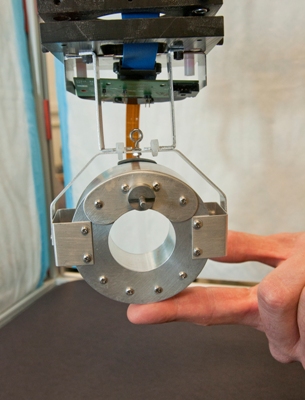SynchroPET, a Long Island, NY-based biotechnology company specializing in manufacture of advanced PET Scanners, has announced that the company will work closely with researchers at Brookhaven National Laboratory to commercialize a portable, small-scale brain-imaging device.
 RatCAP portable scanner
RatCAP portable scanner
The portable PET scanner, developed by researchers at Brookhaven National Laboratory, funded by US Department of Energy’s Office of Science, is a miniature and wearable positron emission tomography scanner that can be used to gain a better understanding of the brain and diseases in live rats. It offers a dynamic range and can be integrated with compact and MRI scanners designed to be worn by rats in a fully conscious state. Earlier, animals need to be made unconscious or had to be immobilized in order to conduct a PET scan. The loss of consciousness of movement did not permit for the study of conscious movement and neurochemistry.
The new device, named the RatCAP (Rat conscious Animal PET) is an advanced custom built collar featuring detectors capable of monitoring the animal’s brain chemistry, information that can be associated with the its real-time activity.
The lead researcher of the project at Brookhaven Laboratory, Dr David Schlyer stated that by studying the chemical messengers present in the brain, scientists can gain a better understanding to various conditions, diseases and disorders such as Parkinson’s disease and drug addiction.
The option agreement signed by SynchroPET provides the company time to investigate the market potential of the product and to device a business plan. The CEO of SynchroPET, Marc Alessi stated that the portable PET scanner can positively impact lives of patients suffering from Parkinson’s disease, Alzheimer’s disease and various types of cancer.